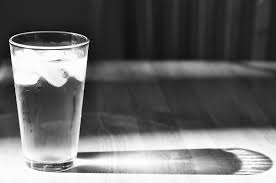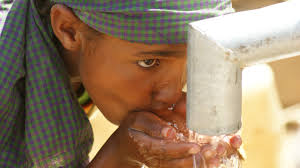How much drinking water do we need to consume per day? It depends on how much the body uses and how much we lose. The views on it are different but the most common one is that a person must drink 8 glasses of water or two liters per day.

We lose water on a constant basis through urine, sweat, breath, bowel movements. This makes it necessary to keep on fueling our body with the intake of water. Deprivation of water can cause fatigue and low brain functioning. Water triggers temporary metabolism, helps in weight loss, prevents skin problems as well as removes toxins from the body. Adequate amount of water intake keeps kidney, colon, bladder and liver healthy. It carries nutrients and helps in the formation of blood.
Not only direct intake of water, indirect intake of foods with high water content also provides the much needed water to the body, but only in a small amount. Even diuretic(anything — food, drink, or medicine — that increases the flow of urine) drinks like tea or coffee amount to the daily intake of water. Vegetarian as well as non-vegetarian foods also have water content but in very less amount. So direct intake of water in a significant amount is required. Only about 20 percent of water intake comes from food sources on an average.
Many health enthusiasts believe that the moment we feel thirsty is the stage of severe dehydration. So, we should drink water even when we are not thirsty and keep drinking a small amount in short intervals. The feeling of thirst is “body” letting the brain know that it requires water immediately or bad things can happen.

Some people are against it and opine that we can just drink when we feel thirsty. It is just a kind of instinct that has helped people live. Thirst is a good determination of water requirement and can be used to drink adequate amount of water.
General standards given by Institute of Medicine is that men need about 13 glasses of water (3 liters) per day and women need 9 glasses (2.2 liters), including the water intake from water content in food. But the requirements may vary according to weight, age, sex and the activities one is involved in throughout the day.
Things to Keep in Mind
Few things to keep in mind to maintain your amount of water consumption.
- Exercise (duration and type) and amount of perspiration:
Easy exercises need about a liter of extra water whereas exercising for more than an hour requires more water. Extensive physical exercises require a lot more water as well as other minerals like sodium, potassium, etc. - Increased sweating:
If you sweat more, you should drink more water. The sweat might be due to exercises or environmental conditions or health problems. - Environment:
Hot and dry climate causes high perspiration and the requirement of water multiplies. If not, many health problems might arise. Fluid intake varies with altitude of a place too. - Health Conditions:
Many health conditions like constipation, bowel problems, diarrhea, etc increase the need of water. Other health problems like vomiting also makes the body lose water and requires replacement. Fever can cause sweating and dehydration. So, people with fever have to drink a lot of water. There are many other health problems like low blood pressure level or UTI which might increase the need too. - Breastfeeding:
Body fluids are made up of water and goes for breast-milk. To produce healthy amount of breast milk, a lot of water has to be consumed. Breastfeeding women should drink more than 13 glasses of water per day.

Some Tips
- Drink when thirsty
- Don’t drink forcefully or more than you can
- Drink more if the climate is hot and dry
- Drink more when you sweat more or when you exercise
Old people do not feel thirsty often even though their body requires water. So, they must drink water regularly in short intervals of time.
More water intake might cause discomfort and frequent urination. It might dilute the electrolyte content of blood and cause hyponatremia. Urine color changes according to the water consumption and need. If urine is yellow, it means that the amount of water you take is lacking. Optimal hydration is not something you should worry about. You only have to worry about your water intake if you feel dehydrated and extremely thirsty.
Plain water or electrolyte water, low fat milk, 100 percent fruit juice (no added sugar); any of these can be great to keep oneself hydrated. Just keep in mind that high fat and high calorie drinks must be avoided. And also to consume these drinks according to one’s health conditions. And remember, plain water is the best.